Dentures
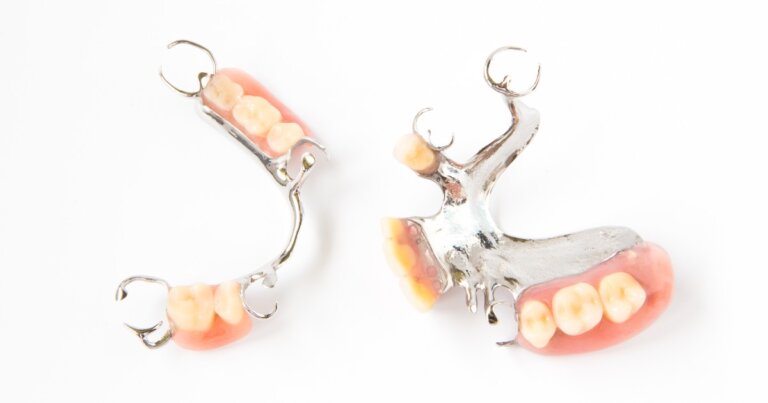
What Are Dentures?
Dentures are removable oral appliances designed to replace missing teeth and surrounding tissues. They are custom-made to fit comfortably in your mouth and replicate the appearance of natural teeth. Not only do they enhance your smile, but they also play a crucial role in supporting facial muscles, preventing sagging, and improving speech and chewing abilities.
These dental prosthetics have come a long way since their inception, and today, there are various types of dentures available to cater to different needs and preferences. Whether you’re missing a few teeth or require a full set, dentures can offer a remarkable solution to reclaim your oral well-being and self-assurance.
Before you deciding on whether Dentures are right for you, there are some things you should know:
- Who Needs Dentures?
- What Are The Advantages Of Dentures?
- What Are The Different Types Of Dentures?
- How Much Do Dentures Cost?
- What Are The Steps In The Denture Procedure?
- Can I Have Dentures If I Am Pregnant?
- How Long Do Dentures Last?
- What Are Common Problems with Dentures?
If you have any further questions about Dentures or other dental services offered at Atlas Dental, please contact us.

Free Phone Consultation
Have questions about cosmetic dentures for missing teeth? Book a free phone consult with our Toronto dentist

5 star google reviews
Our patients love their cosmetic looking denture smile! See for yourself why patients choose Atlas Dental.

Book a denture appointment online
We make custom fitted dentures to help our patients smile confidently again.
Who Needs Dentures?
Dentures are a valuable dental solution for individuals who have experienced tooth loss, whether it’s a single tooth or multiple teeth. Several factors can lead to tooth loss, and some common situations where dentures may be needed include:
- Advanced Tooth Decay: Severe tooth decay that goes untreated can lead to tooth loss. When teeth become extensively damaged and cannot be restored through fillings or root canal treatment, extraction may be necessary, and dentures can be a suitable replacement option.
- Gum Disease (Periodontal Disease): Untreated gum disease can cause the gums to recede and weaken the supporting structures of the teeth, leading to tooth loss. In such cases, dentures can help restore the functionality and aesthetics of the mouth.
- Accidents or Trauma: Accidents or injuries involving the mouth can result in the loss of one or more teeth. Dentures can be an effective solution to replace the missing teeth and restore oral function.
- Aging: As we age, natural wear and tear on our teeth and gums can lead to tooth loss. Seniors often require dentures, especially if they have lost a significant number of teeth over the years.
- Congenitally Missing Teeth: Some individuals are born with missing or malformed teeth due to congenital conditions. Dentures can be custom-made to fill in the gaps and improve their ability to chew and speak properly.
- Medical Conditions and Treatments: Certain medical conditions, like cancer, may necessitate the removal of affected teeth. Dentures can provide an essential solution for individuals who have undergone dental extractions due to medical reasons.
- Inability to Afford Other Dental Procedures: In some cases, individuals may not have the financial means to undergo complex dental procedures like dental implants or dental bridges. Dentures can offer a more cost-effective solution for tooth replacement.
It’s essential to note that not everyone who has missing teeth requires dentures. In some instances, dental bridges or dental implants may be more suitable options, depending on the individual’s oral health, bone density, and personal preferences. To determine the best course of action, it is crucial to consult with a qualified dentist who can assess your specific dental needs and recommend the most appropriate treatment plan to restore your smile and oral functionality. If you have further questions about Dentures, please contact us.
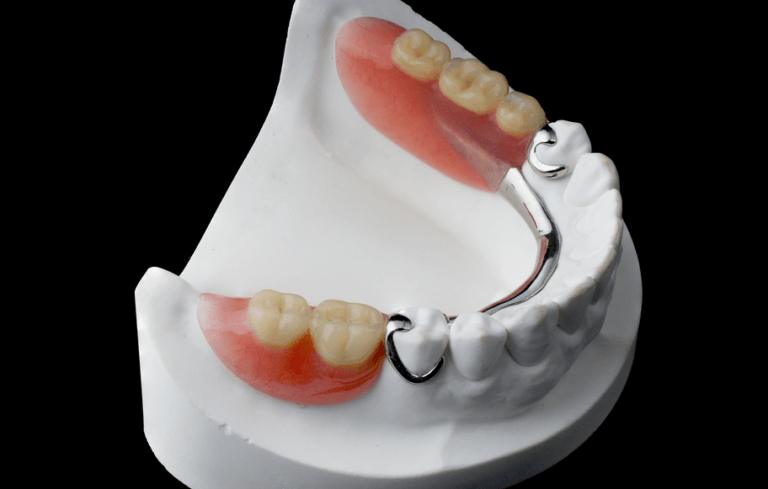
What Are The Advantages Of Dentures?
Dentures offer several advantages for individuals who have experienced tooth loss. These benefits go beyond simply restoring a smile, and they play a significant role in enhancing oral health, overall well-being, and self-confidence. Here are some of the key advantages of dentures:
- Improved Chewing and Eating: Missing teeth can make it challenging to chew and enjoy certain foods. Dentures restore the ability to bite and chew effectively, allowing individuals to enjoy a more varied and nutritious diet.
- Enhanced Speech: Tooth loss can affect speech clarity, leading to difficulties in pronouncing certain words. Dentures fill in the gaps, providing better support for the tongue and lips, which can result in clearer and more confident speech.
- Restored Facial Aesthetics: Dentures help maintain the structure of the face by supporting the lips and cheeks. This prevents a sunken appearance, which is common in individuals with multiple missing teeth. Restoring facial aesthetics can have a positive impact on self-esteem and confidence.
- Cost-Effective Solution: Compared to other tooth replacement options like dental implants, dentures are generally more affordable. They offer a practical solution for individuals who may not have the financial means to undergo more complex dental procedures.
- Versatility: Dentures come in various types, catering to different degrees of tooth loss. Whether you need partial dentures to replace a few missing teeth or complete dentures for a full set, there’s a suitable option for everyone.
- Non-Invasive Treatment: Unlike dental implants, which require surgery and integration with the jawbone, dentures are a non-invasive tooth replacement option. The process of getting dentures is generally quicker and more comfortable for patients.
- Customizable Appearance: Dentures are custom-made to match the color, shape, and size of the natural teeth, ensuring a seamless and natural-looking smile.
- Easy Maintenance: Dentures are easy to clean and maintain with regular brushing and soaking. Dentists provide instructions on proper care to keep them in good condition.
- Immediate Results: In many cases, dentures can be fitted soon after tooth extraction, meaning you don’t have to wait for a healing period before having a functional set of teeth.
- Preventing Further Tooth Loss: By filling in the gaps left by missing teeth, dentures help prevent adjacent teeth from shifting positions. This can safeguard the remaining natural teeth from further dental problems.
It’s important to remember that while dentures offer numerous advantages, they do require proper care and periodic adjustments to ensure optimal comfort and functionality. Regular dental check-ups are essential to maintain oral health and address any issues that may arise with dentures. By working closely with a qualified dentist, individuals can fully enjoy the benefits of dentures and embrace a renewed sense of confidence and well-being. If you have further questions about Dentures, please contact us.
What Are The Different Types Of Dentures?
Dentures come in several types, each designed to address specific dental needs and preferences. The main types of dentures include: Complete Dentures, Partial Dentures, and Implant-Supported Dentures:
Complete Dentures
Complete Dentures, also known as full dentures, are used when all natural teeth in the upper or lower jaw are missing. They consist of a full set of artificial teeth set in a pink acrylic base that resembles gum tissue. Complete dentures are custom-made to fit the unique contours of the individual’s mouth. They rely on suction and sometimes dental adhesives to stay in place.
Immediate Dentures
Immediate Dentures are similar to complete dentures, except they are a temporary solution provided to patients who need their teeth extracted and can’t be without teeth during the healing process. These dentures are pre-made and are placed in the mouth immediately after tooth extraction. Over time, as the gums heal and change shape, adjustments or a new set of complete dentures may be required for a better fit.
Tooth Supported Overdentures
A Tooth Supported Overdenture is a removable dental prosthesis that fits over a few remaining natural teeth. These remaining teeth act as anchors, providing better stability and retention for the overdenture.
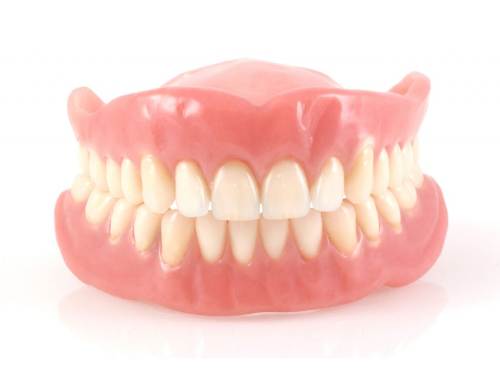
Partial Dentures
Partial Dentures are employed when some natural teeth remain in the upper or lower jaw. Various kinds of removable partial dentures exist:
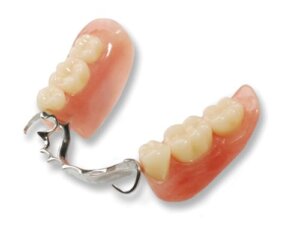
Implant Dentures
Implant-Supported Dentures are securely anchored to dental implants surgically placed in the jawbone. They offer superior stability, preventing slippage or movement during speaking or eating. These types of dentures can be made for patients missing some teeth, or all their teeth, and are an excellent option for patients with adequate bone density.
All-on-4 or Teeth-in-a-day treatment is one type of full mouth reconstruction procedure that involves dental implant-supported dentures.
Whether you are looking to replace one missing tooth or multiple missing teeth for a healthy smile, dental implants are a safe and reliable treatment option.
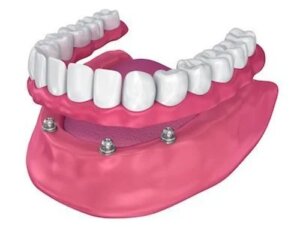
Each type of denture has its unique advantages and considerations, and the choice of denture depends on factors such as the extent of tooth loss, oral health, bone density, budget, and personal preferences. Consulting with a qualified dentist is crucial to determine the most suitable type of denture for individual needs and to ensure proper fitting and long-term comfort. If you have further questions about Dentures, please contact us.
Cost of Dentures
Dentures can be made to replace all the teeth (complete denture) or some of the teeth (partial denture), for the upper jaw (maxillary) and/or bottom jaw (mandibular). Dentures can be made entirely of acrylic, or a combination of acrylic with metal frameworks, rests and clasps. Dentures are also made to sit on natural teeth, or dental implants (implant overdenture). Therefore, depending on the type of denture you are looking for, the cost can range from $438 to $1832 plus dental lab fee. The codes relevant to dentures in the Ontario Dental Association’s Suggested Fee Guide appear as follows:
Dentures, Complete, Standard (e.g. Complete Denture)
- 51101 – Maxillary: $1115 + Dental Lab Fee
- 51102 – Mandibular: $1419 + Dental Lab Fee
Dentures, Complete, Provisional (e.g. Immediate Complete Denture)
- 51601 – Maxillary: $577 + Dental Lab Fee
- 51602 – Mandibular: $769 + Dental Lab Fee
Dentures, Complete, Overdentures, Tissue Borne, Supported by Natural Teeth with or without Coping Crowns, no Attachments (e.g. Tooth Supported Overdenture)
- 51711 – Maxillary: $1656+ Dental Lab Fee
- 51712 – Mandibular: $2037+ Dental Lab Fee
Dentures, Complete, Overdentures, Tissue Borne, Supported by Implants with or without Coping Crowns, no Attachments (e.g. Implant Denture; cost of dental implants not included)
- 51721 – Maxillary: $1656 + Dental Lab Fee
- 51722 – Mandibular: $2037 + Dental Lab Fee
Dentures, Partial, Acrylic Base (Provisional) (With or Without Clasps). (e.g. Single Tooth Dentures, Essix Dentures)
- 52101 – Maxillary: $462 + Dental Lab Fee
- 52102 – Mandibular: $462 + Dental Lab Fee
Dentures, Partial, Polymer, Resilient Retainer. (e.g. Valplast Flexible Partial Dentures)
- 52201 – Maxillary: $678 + Dental Lab Fee
- 52202 – Mandibular: $678 + Dental Lab Fee
Dentures, Partial, Acrylic, With Metal Wrought/Cast Clasps and/or Rests. (e.g. Acrylic Partial Dentures)
- 52301 – Maxillary: $775 + Dental Lab Fee
- 52302 – Mandibular: $775 + Dental Lab Fee
Dentures, Partial, Free End, Cast Frame/Connector, Clasps and Rests. (e.g. Cast partial Dentures)
- 53101 – Maxillary: $1419 + Dental Lab Fee
- 53102 – Mandibular: $1419 + Dental Lab Fee
Dentures, Partial, Tooth-Borne, Cast Frame/Connector, Clasps and Rests. (e.g. Cast partial Dentures)
- 53201 – Maxillary: $1319 + Dental Lab Fee
- 53202 – Mandibular: $1319 + Dental Lab Fee
Dentures are sometimes considered a supplementary service by dental insurance plans and may or may not be covered by your dental insurance. Be sure to find out from your dental insurance plan provider how much you are eligible for before going ahead with dental treatment. Your dentist can help you submit an predetermination to your dental insurance. Our fees are consistent with the ODA Fee Guide.
For patients without dental insurance, Atlas Dental is pleased to offer dental financing through Dentalcard. Affordable payment plans start at 7.95% for terms of 6 months to 6 years. To learn more about Dentalcard dental treatment financing, follow this link.
What Are The Steps In The Denture Procedure?
The denture procedure typically involves several steps, starting from the initial consultation with the dentist to the final placement of the dentures. The process may vary depending on the type of denture and individual patient needs, but here are the general steps involved in the denture procedure:
- Initial Consultation and Examination: The first step is to schedule an appointment with a dentist who specializes in dentures or prosthodontics. During the initial consultation, the dentist will examine your oral health, evaluate the condition of your teeth and gums, and discuss your specific dental needs and concerns.
- Treatment Planning: Based on the examination and assessment, the dentist will create a treatment plan tailored to your situation. This plan will outline the type of denture recommended, any necessary tooth extractions, and the timeline for the procedure. Please review these pre-operative instructions before your visit.
- Tooth Extractions (If Required): If you need to have any remaining natural teeth extracted before getting dentures, the dentist will perform these extractions at this stage. In some cases, immediate dentures may be placed immediately after extractions to provide temporary tooth replacements during the healing period.
- Impressions and Bite Registration: To create custom dentures that fit your mouth perfectly, the dentist will take impressions of your gums and any remaining teeth (in the case of partial dentures). These impressions help in crafting dentures that match the exact contours of your oral structures. Additionally, bite registration records are taken to ensure that your upper and lower teeth come together correctly.
- Denture Fabrication: Using the impressions and bite registration, a dental laboratory will fabricate the dentures according to the dentist’s specifications. The lab will carefully craft the artificial teeth and design the acrylic base to mimic gum tissue.
- Try-In Appointment: Once the dentures are ready, you will have a try-in appointment. During this visit, the dentist will check the fit, shape, and color of the dentures. Any necessary adjustments will be made to ensure the dentures sit comfortably and function properly in your mouth.
- Final Fitting and Placement: After any necessary adjustments are made, the final dentures are ready for placement. The dentist will carefully insert the dentures into your mouth and make any final adjustments for a precise fit.
- Post-Placement Check-Ups: After you receive your dentures, you’ll need to visit the dentist for follow-up appointments. These check-ups are essential to ensure that your dentures fit comfortably and effectively. If any discomfort or issues arise, the dentist will make further adjustments or modifications as needed.
- Denture Care and Maintenance Instructions: The dentist will provide you with detailed post-insertion instructions on how to care for and maintain your dentures properly. This will include guidance on cleaning, storing, and wearing the dentures to extend their lifespan and maintain oral health.
It’s essential to follow the dentist’s instructions and attend regular check-ups to ensure that your dentures remain in good condition and continue to meet your oral health needs. With proper care and maintenance, dentures can provide years of functionality and a confident smile. If you have further questions about Dentures, please contact us.
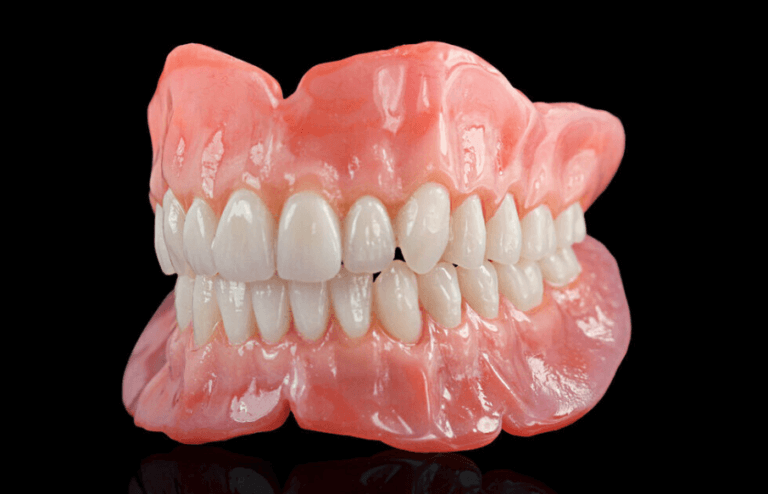
Can I Have Dentures If I Am Pregnant?
While it is generally safe to have dentures if you are pregnant, there are some important considerations to keep in mind. Dental health is crucial during pregnancy, as hormonal changes and increased blood flow can impact the gums and teeth. If you are pregnant and considering dentures, here are some essential points to consider:
- Consult with Your Obstetrician: Before undergoing any dental procedure, including getting dentures, it’s essential to consult with your obstetrician. They can evaluate your overall health and pregnancy status and provide guidance on the best timing for any non-emergency dental treatments.
- Address Urgent Dental Issues First: If you have urgent dental problems, such as severe tooth decay or dental infections, it’s important to address these issues promptly. Dental infections during pregnancy can potentially affect the health of both the mother and the baby. In such cases, the dentist may recommend appropriate treatments before proceeding with dentures.
- Choose the Right Time: Pregnancy can be physically demanding, and the first trimester, in particular, is crucial for fetal development. If possible, it’s best to postpone non-essential dental procedures, such as dentures, until the second trimester or after delivery when the risk to the developing baby is lower.
- Consider Alternatives: If the need for dentures is not urgent, you may consider alternative temporary solutions, such as partial dentures or dental bridges, until after delivery. These options can provide relief for tooth loss without undergoing a more extensive denture procedure during pregnancy.
- Maintain Good Oral Hygiene: Regardless of whether you are pregnant or not, maintaining good oral hygiene is essential. Brush your teeth twice a day with fluoride toothpaste, floss daily, and visit the dentist for regular check-ups and cleanings.
- Monitor Gum Health: Pregnancy hormones can lead to gum sensitivity and potential gum disease. Pay close attention to your gum health and report any unusual changes, such as bleeding or swelling, to your dentist.
- Nutritional Considerations: Proper nutrition is vital during pregnancy, and having functional teeth or dentures that allow you to eat a balanced diet is crucial. Dentures can improve your ability to chew and enjoy nutritious foods, supporting both your health and your baby’s development.
Remember that every pregnancy is unique, and individual circumstances may vary. Be sure to communicate openly with both your dentist and obstetrician to make informed decisions about your dental care during pregnancy. With proper planning and care, dentures can be a suitable option if you are pregnant and experiencing tooth loss or other dental issues. If you have further questions about Dentures, please contact us.
How Long Do Dentures Last?
The lifespan of dentures can vary depending on several factors, including the type of dentures, how well they are cared for, and changes in the oral health of the individual. On average, dentures can last anywhere from 5 to 10 years. Here are some key factors that can influence the longevity of dentures:
- Quality of Materials: The quality of the materials used in making the dentures can significantly impact their durability. Higher-quality dentures, which may be more expensive, are often more resilient and long-lasting.
- Daily Care and Maintenance: Proper care and maintenance play a crucial role in extending the life of dentures. Regularly cleaning the dentures with a soft brush and denture cleaner, soaking them overnight, and handling them with care can help prevent damage and wear.
- Oral Health Changes: Over time, the shape of the gums and jawbone can change, particularly if there are remaining natural teeth. These changes can affect the fit of the dentures and may require adjustments or relining to ensure they continue to fit comfortably and securely.
- Bite Changes: In some cases, changes in the bite or the way the dentures come together when chewing can lead to excessive wear on certain areas of the dentures. This can cause them to deteriorate faster.
- Accidents or Damage: Accidents, such as dropping the dentures or biting down on hard objects, can lead to damage or breakage. It’s essential to handle dentures with care to avoid unnecessary wear and tear.
- Age and Use: As dentures age and are used regularly, they may naturally wear down over time, affecting their fit and function.
- Bone Loss: When natural teeth are missing, the jawbone can undergo resorption (shrinkage) over time. This can affect the fit of the dentures and may require adjustments or new dentures to accommodate the changes.
If you notice any signs of damage or discomfort with your dentures, it’s crucial to visit your dentist for evaluation and possible adjustments. Regular dental check-ups are essential to monitor the condition of your dentures and address any issues promptly. If you have further questions about Dentures, please contact us.
What Are Common Problems with Dentures?
While dentures can significantly improve oral function and aesthetics, they may also come with some common problems. These issues can occur due to various factors, including wear and tear, changes in the mouth, or inadequate care. Here are some of the typical problems that denture wearers may experience:
- Poor Fit: Over time, changes in the jawbone and gums can lead to a poor fit of the dentures. Ill-fitting dentures may cause discomfort, difficulty in speaking and eating, and may even lead to sores or irritation in the mouth.
- Loose or Slipping Dentures: Dentures that don’t fit properly may slip or move during speaking or eating, which can be embarrassing and affect confidence. This issue may be more pronounced with lower dentures, as they have less surface area to create suction.
- Gum and Mouth Irritation: Poorly fitting dentures can cause irritation and sore spots on the gums and the soft tissues of the mouth. This discomfort can be alleviated with adjustments by a dentist.
- Chewing and Speaking Difficulties: Dentures that are not well-fitted or have uneven surfaces may lead to challenges in chewing food effectively or speaking clearly.
- Difficulty Tasting Food: Some denture wearers report a reduced ability to taste food due to the covering of the palate (roof of the mouth) by a full upper denture.
- Bone Loss: When natural teeth are missing, the jawbone can gradually shrink or resorb over time. This can cause changes in the fit of the dentures, requiring adjustments or new dentures.
- Breakage or Damage: Accidents or mishandling of dentures can lead to breakage or damage to the denture base or artificial teeth.
- Staining and Discoloration: Dentures can become stained or discolored over time, particularly if they are not cleaned regularly or if certain foods and beverages are consumed frequently.
- Bad Breath (Halitosis): If dentures are not cleaned properly, bacteria can accumulate on the surface, leading to bad breath.
- Sore Jaw and Facial Muscles: New denture wearers or those with poor-fitting dentures may experience soreness in the jaw and facial muscles as they adjust to wearing the prosthetic.
- Psychological Impact: Some individuals may experience psychological and emotional challenges, such as a fear of dentures falling out or feeling self-conscious about wearing dentures.
It’s important to address these problems promptly to ensure optimal comfort, function, and oral health. If you experience any issues with your dentures, consult your dentist for evaluation and adjustments. Regular dental check-ups are essential to monitor the condition of your dentures and address any potential problems before they worsen. Proper care and maintenance, along with timely adjustments, can help mitigate many of these common denture-related problems. If you have further questions about Dentures, please contact us.
We also think you’ll like…
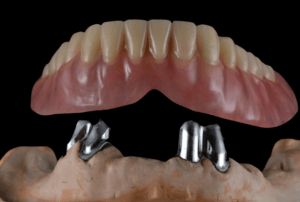
Tooth Supported Overdenture
Tooth Supported Overdenture What Is A Tooth Supported Overdenture? A Tooth Supported Overdenture is a type of removable complete denture prosthesis that rests over the
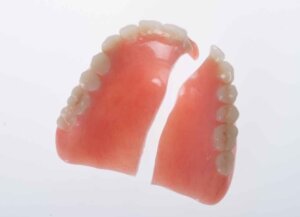
Denture Repair
Denture Repair What Is A Denture Repair? Dentures, also known as false teeth, are removable replacements for missing teeth and surrounding tissues. They are custom-made
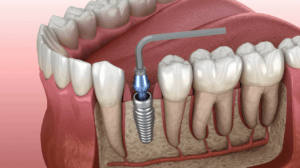
Immediate Dental Implant Placement
Immediate Dental Implant Placement What Is Immediate Dental Implant Placement? Immediate Dental Implant Placement is a revolutionary approach towards dental implants that offers numerous advantages
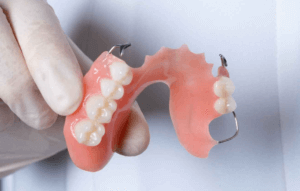
Acrylic Partial Denture
Acrylic Partial Denture What Is An Acrylic Partial Denture? An Acrylic Partial Denture is a removable partial dental prosthetic designed to replace one or more
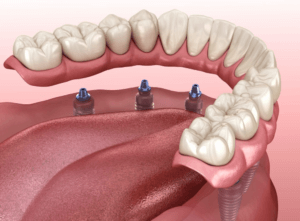
Implant Denture
Implant Denture What Is An Implant Denture? An Implant Denture, also known as an implant-supported overdenture, is a dental appliance designed to restore missing teeth
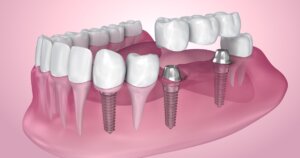
Dental Implants
Dental Implants What are Dental Implants? Dental Implants are revolutionary replacements for missing teeth that not only look and feel like natural teeth but also

